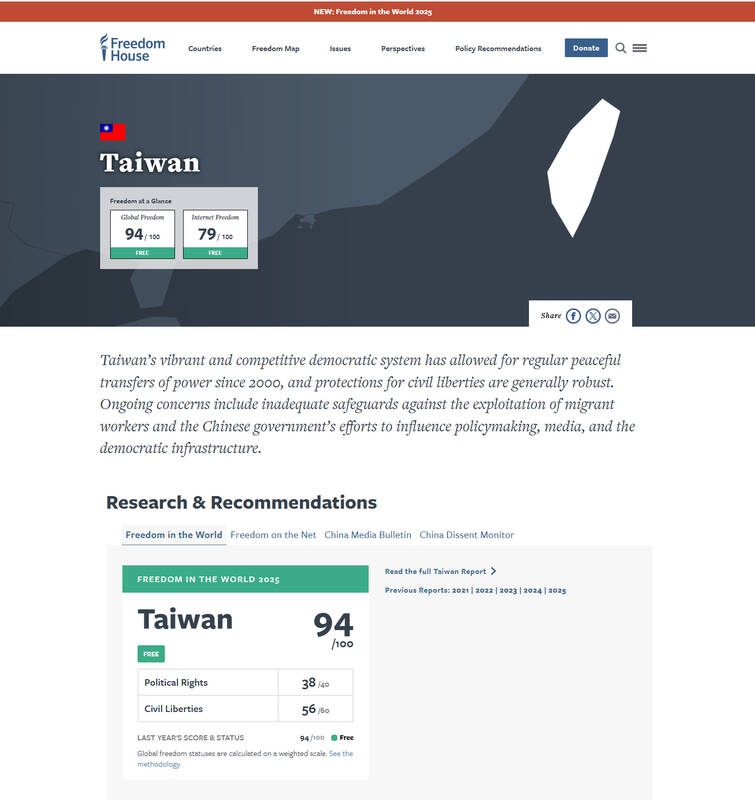Taiwan maintained its status as a “free” country in the latest edition of the Freedom in the World report released yesterday.
With 94 points, Taiwan ranked second in Asia for freedom, the US advocacy group said.
The report, Freedom in the World 2025: The Uphill Battle to Safeguard Rights, said that global freedom declined for the 19th consecutive year due to “political violence and manipulation of elections, ongoing armed conflicts and deepening repression.”

Screengrab from www.freedomhouse.org
The report assesses political rights and civil liberties around the world, providing numerical ratings and descriptive evaluations for each country and region.
This year’s report covers developments in 208 countries and regions from Jan. 1 to Dec. 31 last year.
Last year, “60 countries experienced declines in their political rights and civil liberties, while only 34 registered improvements,” the report said.
The report called for everyone who values democracy to work together to defend it in the coming year.
Election-related violence was a major issue, occurring in 40 percent of the 66 places that held national elections last year, it said.
“Candidates were attacked in at least 20 countries, while polling places were attacked in at least 14,” the report said.
“Taiwan’s vibrant and competitive democratic system has allowed for regular peaceful transfers of power since 2000, and protections for civil liberties are generally robust,” Freedom House said on its Web site. “Ongoing concerns include inadequate safeguards against the exploitation of migrant workers and the Chinese government’s efforts to influence policymaking, media and the democratic infrastructure.”
Taiwan’s score of 94 was the same as last year, with 38 out of 40 points in political rights and 56 out of 60 points in civil liberties.
This classifies Taiwan as a “free” country, ranking second in Asia behind Japan, which scored 96 points.
Freedom declined around the world last year with authoritarians solidifying their grip, but South Asia led a series of bright spots, Freedom House said.
The Washington-based group elevated two countries to the status of “free” — Senegal, where the opposition triumphed after the outgoing president’s attempt to delay elections was defeated, and Bhutan, the Himalayan kingdom, which consolidated a transition to democracy with competitive polls.
Bhutan gained the distinction of being the only South Asian country classified as free, while others in the region such as Bangladesh and Sri Lanka made strong gains in the index without changing categories.

Seventy percent of middle and elementary schools now conduct English classes entirely in English, the Ministry of Education said, as it encourages schools nationwide to adopt this practice Minister of Education (MOE) Cheng Ying-yao (鄭英耀) is scheduled to present a report on the government’s bilingual education policy to the Legislative Yuan’s Education and Culture Committee today. The report would outline strategies aimed at expanding access to education, reducing regional disparities and improving talent cultivation. Implementation of bilingual education policies has varied across local governments, occasionally drawing public criticism. For example, some schools have required teachers of non-English subjects to pass English proficiency

‘FORM OF PROTEST’: The German Institute Taipei said it was ‘shocked’ to see Nazi symbolism used in connection with political aims as it condemned the incident Sung Chien-liang (宋建樑), who led efforts to recall Democratic Progressive Party (DPP) Legislator Lee Kun-cheng (李坤城), was released on bail of NT$80,000 yesterday amid an outcry over a Nazi armband he wore to questioning the night before. Sung arrived at the New Taipei City District Prosecutors’ Office for questioning in a recall petition forgery case on Tuesday night wearing a red armband bearing a swastika, carrying a copy of Adolf Hitler’s Mein Kampf and giving a Nazi salute. Sung left the building at 1:15am without the armband and apparently covering the book with a coat. This is a serious international scandal and Chinese

TRADE: The premier pledged safeguards on ‘Made in Taiwan’ labeling, anti-dumping measures and stricter export controls to strengthen its position in trade talks Products labeled “made in Taiwan” must be genuinely made in Taiwan, Premier Cho Jung-tai (卓榮泰) said yesterday, vowing to enforce strict safeguards against “origin laundering” and initiate anti-dumping investigations to prevent China dumping its products in Taiwan. Cho made the remarks in a discussion session with representatives from industries in Kaohsiung. In response to the US government’s recent announcement of “reciprocal” tariffs on its trading partners, President William Lai (賴清德) and Cho last week began a series of consultations with industry leaders nationwide to gather feedback and address concerns. Taiwanese and US officials held a videoconference on Friday evening to discuss the

PERSONAL DATA: The implicated KMT members allegedly compiled their petitions by copying names from party lists without the consent of the people concerned Judicial authorities searched six locations yesterday and questioned six people, including one elderly Chinese Nationalist Party (KMT) member and five KMT Youth League associates, about alleged signature forgery and fraud relating to their recall efforts against two Democratic Progressive Party (DPP) legislators. After launching a probe into alleged signature forgery and related fraud in the KMT’s recall effort, prosecutors received a number of complaints, including about one petition that had 1,748 signatures of voters whose family members said they had already passed away, and also voters who said they did not approve the use of their name, Taipei Deputy Chief Prosecutor